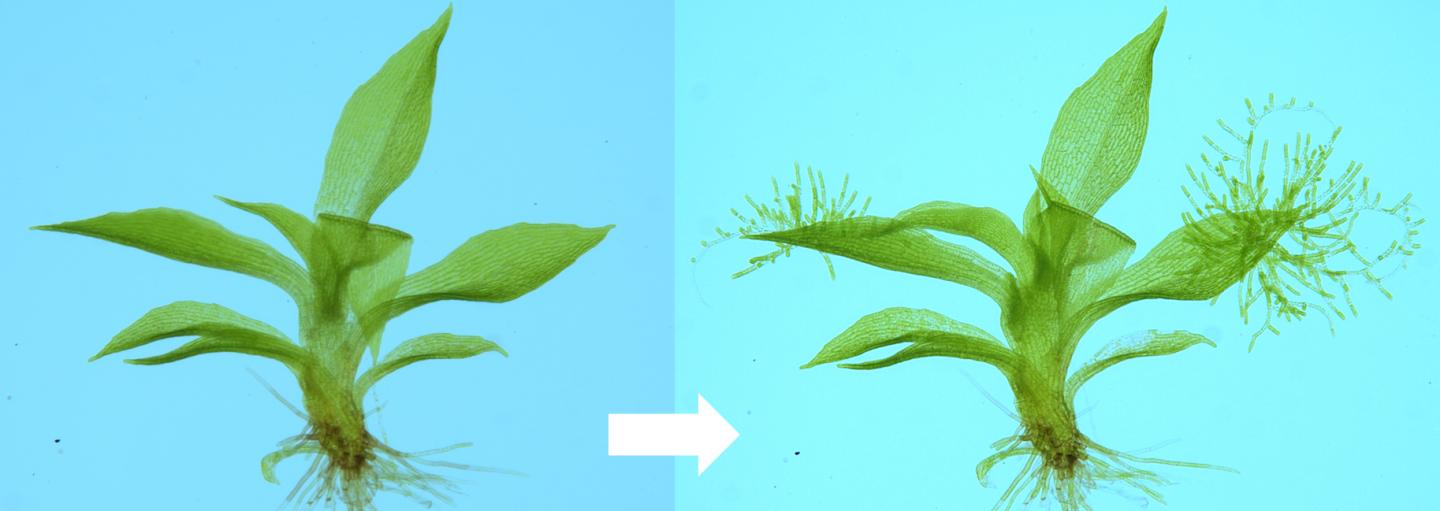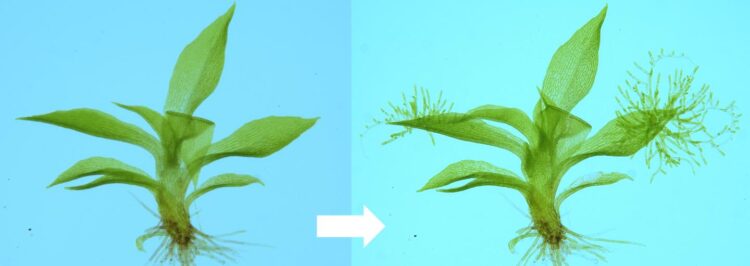Discovery of a new adaptive strategy that plants use under harsh environments

Credit: NIBB
A joint research team from the National Institute for Basic Biology (NIBB) in Japan, Huazhong Agricultural University in China, and the Czech Academy of Sciences in the Czech Republic has discovered that DNA damage causes cells to reprogram themselves into stem cells and regenerate new plant bodies in the moss Physcomitrella patens. The researchers describe this phenomenon as a unique environmental adaptation of plants.
In animals, cells with severe DNA damage undergo apoptosis–cell death–and are eliminated. These new results published in Nature Plants tell a different story for moss cells. Ms. Nan Gu, a NIBB Special Inter-University Researcher who is a graduate student at Huazhong Agricultural University under the mentorship of Dr. Chunli Chen, and her collaborators discovered that when DNA of the moss is damaged, the DNA is immediately repaired. Furthermore, the cells with repaired DNA become stem cells, which can produce an entire plant body, similar to fertilized egg cells. Nan Gu says, “I was shocked by the result, because animal cells select to die, but plant cells select to produce new offspring”.
After Physcomitrella plants were soaked in a DNA-damaging solution for 6 hours, their DNA was severely broken. However, the damaged DNA was repaired to almost its original state within one day. After that, the STEMIN1 gene, a master regulator of reprogramming was triggered. STEMIN1-positive cells eventually became stem cells and went on to form whole plants with stems and leaves.
“It has been known that, in plants, differentiated cells around dead cells can become stem cells. However, this is the first discovery that differentiated cells with damaged DNA themselves become stem cells”, explains Dr. Yosuke Tamada, a co-first author of this study.
“This phenomenon we discovered is a strategy for environmental adaptation, especially in plants, which are not able to escape from adverse environments as quickly as animals”, said Professor Mitsuyasu Hasebe from NIBB, who led the research team.
###
Paper Information
“DNA damage triggers reprogramming of differentiated cells into stem cells in Physcomitrella” by Nan Gu, Yosuke Tamada, Akihiro Imai, Gergo Palfalvi, Yukiko Kabeya, Shuji Shigenobu, Masaki Ishikawa, Karel J. Angelis, Chunli Chen, and Mitsuyasu Hasebe has been published in Nature Plants at DOI: https:/
Media Contact
NIBB Office of Public Relations
[email protected]
Original Source
https:/
Related Journal Article
http://dx.





